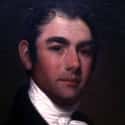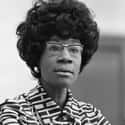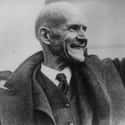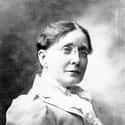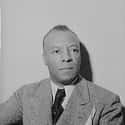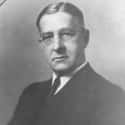-
(#1) William King
- Dec. at 84 (1768-1852)
Even some of you Northeasterners may not know Maine wasn't always its own state. Until 1820, it was part of Massachusetts. William King was a leading proponent of statehood for Maine, and became its first governor, though left the office just over a year after being elected, to take a job in the federal government.
This may not seem like a much, but remember that, before the Civil War, adding states was a very big deal. The country needed to balance the number of free states and slave states, and adding Maine as a free state changed that balance, necessitating the Missouri compromise, which added Missouri as a slave state.
Plus, where would all the Stephen King novels take place if Maine weren't a state? Northern Massachusetts?
-
(#2) Shirley Chisholm, the First Black Congresswoman
Shirley Chisholm became the first African American to run for President of the United States in a major party when, in 1972, she ran in the Democratic primary. Four years before that, she became America's first Black congresswoman, a position in which she served seven terms. She made a name for herself straight away, as a founding member of the Congressional Black Caucus, and for demanding reassignment after placed on the House Forestry Committee.
Chisholm was also one of the major forces for the Equal Right's Amendment. Though the ERA didn't pass, it was one of the biggest causes for second wave radical feminists of the 1970s. Many causes feminists are fighting for today were first fought for by Chisholm.
-
(#3) Andrew Haswell Green
- Dec. at 83 (1820-1903)
The iconic five boroughs of New York City weren't always the single entity we know them as today. Before 1898, Brooklyn, Queens, and Staten Island weren't part of the big Apple. Andrew Haswell Green, who was instrumental in the building of Central Park, helped push for the creation of the Imperial City, creating the modern metropolis. He also had a hand in creating the Bronx Zoo, the Metropolitan Museum of Art, the Washington Bridge, and the New York City Public Library. If you're ever in NYC, chances are you're seeing something Green shepherded into existence.
-
(#4) Eugene V. Debs
- Dec. at 71 (1855-1926)
Contrary to what you may think, Bernie Sanders isn't the first politician to bring socialism to the masses in the United States. In the early 20th century, Eugene V. Debs was a fiery socialist who ran for president — from his prison cell.
Debs ran for president five times as a socialist, receiving around 900,000 votes in 1912, or 6% of the total vote. His most notable election, though, probably came in 1920. He had been imprisoned for his opposition to the United States entering the First World War. Still, he was on the ballot for the Socialist Party and got almost a million votes.
Debs is a historically important figure for his role in promoting radical workers's movements of the first half of the 20th century. Though largely forgotten today, these movements were critical in the fight for employment rights many take for granted, like weekends and the eight-hour day. He also fought against corporate consolidation (aka monopolies) and refused to abandon the socialist cause after many American politicians dropped it like a hot potato in the wake of the Bolshevik Revolution.
-
(#5) Robert Smalls
- Dec. at 76 (1839-1915)
In the aftermath of the Civil War, politics in the South were a complete mess; newly enfranchised slaves found themselves with voting power, and powerful politicians who rose to prominence before the war were struggling with the new order.
In this milieu, Robert Smalls, a former slave, was elected to serve in both houses of the South Carolina state legislature, and spent five terms in the US House of Representatives. He helped fight for rights for Blacks in the state, which were rolled back after Reconstruction, as the Jim Crow period started.
Perhaps even more amazing is how Smalls got his freedom. Before the end of the Civil War, while he was working as a slave aboard a Confederate war ship, he and his fellow slaves commandeered the boat, sailed it to the sea, and surrendered to the Union Navy.
Of the fate of African Americans in the United States, Smalls once famously said: “My race needs no special defense for the past history of them and this country. It proves them to be equal of any people anywhere. All they need is an equal chance in the battle of life.”
-
(#6) Frances Willard
- Dec. at 59 (1839-1898)
In the 1880s, Frances Willard transformed the Women's Christian Temperance Union from a conservative religious organization to an international powerhouse that advocated for women's rights. She, and her organization, were instrumental in pushing for women's suffrage and, more broadly, for women to expand their horizons beyond domestic roles and actively engage in political and social issues.
Yet none of that is why Willard makes this list. In 1884, she authored the Polyglot Petition, advocating for the prohibition of alcohol, opium, and other addictive substances. Willard's tireless efforts to promote Prohibition resulted in 7.5 million people signing the petition, which was publicly unveiled in 1891. She passed away in 1898, but her efforts eventually led to the US Senate proposing the Eighteenth Amendment, in 1917. It was adopted in 1919, and was in effect from 1920 until 1933.
-
(#7) A. Philip Randolph, Who Founded the First African American Labor Union
Most students learn about just a few major leaders of the Civil Rights Movement: Martin Luther King, Malcolm X, and maybe John Lewis, if you've got a really good teacher.
If you want to get to the heart of the movement, look no further than A. Phillip Randolph. Randolph was one of the Big Six of the movement. He helped organized, and spoke at, the March on Washington; was one of the few Civil Rights leaders to meet with President Kennedy; and received a Presidential Medal of Freedom from Lyndon Johnson.
Before the March on Washington, Randolph was a leader in the fight for worker's rights, founding the Brotherhood of Sleeping Car Porters, the first official African American labor union in the United States. In the early 1920s, he ran for office in New York City as a Socialist Party candidate, but lost.
The Civil Rights Movement's commitment to economic issues is often forgotten, written out of history by capitalists who prefer a focus on the nonviolent push for a sanitized, generalized vision of human rights. For this reason, and his socialist tendencies, Randolph has been marginalized in the annals of history. He was, however, an extremely important political figure in his movement and time.
-
(#8) William H. Seward
- Dec. at 71 (1801-1872)
William Seward was the Secretary of State under Abraham Lincoln and Andrew Johnson, and his service as the nation's chief diplomat during and after the Civil War could be enough to write him into the history books. But the reason you should know about him is his indirect role in a conflict that happened long after he was dead, the Cold War.
You see, Seward led the charge for the United States to purchase the Alaska territory. From Russia. Can you imagine if, after the Russian Revolution and during the Cold War, the USSR had access to land in North America? Seward's purchase, regarded in his day as a bad idea and called "Seward's Folly," may have helped prevent armed conflict between the US and the Soviet Union.
With its vast supply of natural resources and tremendous landmass, Alaska has contributed significantly to America's prosperity. The enormous state has provided fisheries, copper, gold, oil, gas, and hundreds of thousands of jobs. Between 1959 and 2016, the state earned $157 billion from oil. Good one, Seward.
Perhaps worth noting, Seward was generally obsessed with snatching up land for the United States, and looked into buying parts of the Virgin Islands, the Dominican Republic, and various other small Caribbean islands. Why would you buy just part of the Dominican Republic? It's already only half an island.
-
(#9) Susanna M. Salter
- Dec. at 101 (1860-1961)
Susanna Salter wasn't just the first woman elected to be a mayor in the United States, but the first woman elected to any political office in the country, when she became the mayor of Argonia, KS on the Prohibition Party ticket in 1887. Salter was elected just weeks after women in Kansas were given the right to vote, and was originally nominated as a joke by a group of men.
As it turns out, Salter knew a lot more about politics than those who jokingly nominated her realized. Her father had been the town's very first mayor, while her father-in-law was a former Kansas lieutenant governor. She won the election, and apparently did her job like a boss. She didn't run for re-election after her term expired, though she lived to 100.
-
(#10) Josiah Bailey
- Dec. at 73 (1873-1946)
The modern conservative mantra of "lower taxes, lower spending" wasn't always so obvious. The governing philosophy of conservatives for much of the past 75 years was largely created by North Carolina Democratic Senator Josiah Bailey.
Bailey wrote the Conservative Manifesto in 1937, proposing market-based, small government solutions to the Great Depression. The manifesto was written as a direct response to Franklin Delano Roosevelt's New Deal politics, and would go on to define conservative politics.
If you like Paul Ryan, Marco Rubio, or any of today's small government politicians, their philosophies go right back to Bailey.
New Random Displays Display All By Ranking
About This Tool
Secretary of State Hillary Clinton, influences the social and political life of the entire United States. Condoleezza Rice is the first female African American Secretary of State in the history of the United States with legendary political achievements, Richard Bruce Cheney is considered the most powerful vice president in American history and a controversial politician. These famous politicians in American history have their own extraordinary experiences.
Only by fully understanding the legendary deeds of these most influential politicians in American history can people objectively evaluate those who have contributed to the development of the country. The random tool introduced 10 American politicians who changed history.
Our data comes from Ranker, If you want to participate in the ranking of items displayed on this page, please click here.











